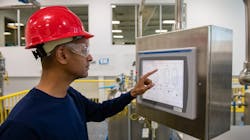Rockwell CFO: Supply Chain Still Limiting Factor No. 1
A Federal Reserve Bank of New York index tracking the health of the world’s supply chains improved markedly in February to dive below its historical average and to its lowest level since August 2019.
But the Global Supply Chain Pressure Index’s suggestion that things “have returned to normal” rings a little hollow to business leaders still dealing with component shortages and shipping delays. Count Rockwell Automation Inc. CFO Nick Gangestad among them.
“As we think about our revenue projections in the second, third and fourth quarter, they still are very heavily driven by our view of what happens with the supply chain versus what happens with demand,” Gangestad told attendees of this week’s JPMorgan Industrials Conference while discussing the 26,000-employee global automation giant’s better-than-expected first-quarter order pace and growing backlog.
Echoing recent comments from many public-company executives about supply chains gradually getting healthier while still needing nursing in some areas, Gangestad said the Rockwell team doesn’t expect a fast acceleration that will remove remaining constraints. Instead, he sounded more like Jochen Goetz, his peer at Daimler Truck Holding AG.
“We certainly still, every week, will deal with bad-news type calls where a supplier will call us and say, ‘You know what you were planning on next month and the month after that? We’re not going to be able to ship all of that to you,’” he said, adding that “the proportion of those types calls have been going down [but] they’re not going away.”
The key culprits remain the same: Semiconductors and other electronic components account for the majority of constraints for Rockwell, which finished 2022 with a backlog worth $5 billion versus its pre-pandemic level of about $2 billion. The situation with more classic industrial components, Gangestad added, is getting closer to normal but it will be a while before Rockwell makes a serious dent in that $5 billion backlog.
“We feel pretty confident it won’t be in ’23,” he said. “To say the middle of ’24? I certainly could see a scenario like that. I could see a scenario where it’s later than that.”
Gangestad and Rockwell Chairman and CEO Blake Moret in late January reported fiscal first-quarter results that led them to lift their outlook for the year. Milwaukee-based Rockwell is now on pace to grow sales between 11% and 15%, up from its previous range of 9% to 13% while operating margins also are expected to grow by half a percentage point to about 21%.
The company’s shares (Ticker: ROK) have been reflecting that optimism, having climbed more than 15% to about $282 over the past six months. (The Standard & Poor’s 500 Index is essentially flat during that period.) Rockwell’s market capitalization now tops $32 billion.
About the Author
Geert De Lombaerde
Senior Editor
A native of Belgium, Geert De Lombaerde has been in business journalism since the mid-1990s and writes about public companies, markets and economic trends for Endeavor Business Media publications, focusing on IndustryWeek, FleetOwner, Oil & Gas Journal, T&D World and Healthcare Innovation. He also curates the twice-monthly Market Moves Strategy newsletter that showcases Endeavor stories on strategy, leadership and investment and contributes to other Market Moves newsletters.
With a degree in journalism from the University of Missouri, he began his reporting career at the Business Courier in Cincinnati in 1997, initially covering retail and the courts before shifting to banking, insurance and investing. He later was managing editor and editor of the Nashville Business Journal before being named editor of the Nashville Post in early 2008. He led a team that helped grow the Post's online traffic more than fivefold before joining Endeavor in September 2021.
